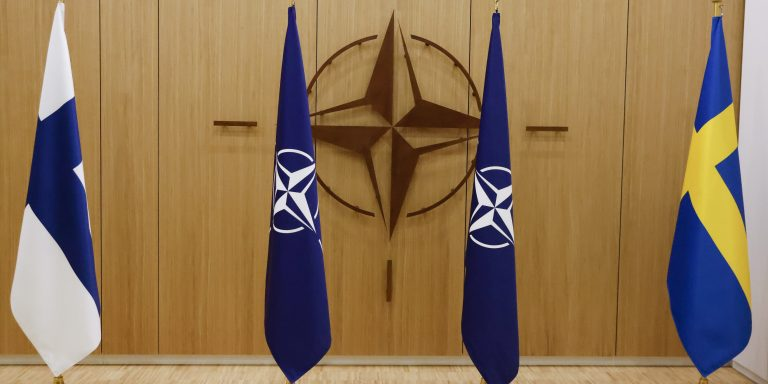
- Throughout Russia’s war on Ukraine, the Kremlin’s disinformation efforts have sought to craft and disseminate false narratives that serve several political goals and influence public opinion about the conflict.
- Since April 2022, Russian-backed information manipulation networks online have sought to seed and amplify a number of false narratives regarding Sweden and Finland’s NATO application, which was formally submitted on May 18, 2022.
- Many of the false or misleading narratives targeting Sweden are centered around sensitive and polarizing topics in the country related to immigration, Islamophobia, and far-right conspiracy theories.
- According to our monitoring, between September 27 – October 3, 2022, posts alleging that the U.S. was responsible for the sabotage of Nord Stream pipelines increased by 15,000% across 25 social media platforms compared to the week prior.
Leading up to and continuing throughout Russia’s war on Ukraine, the Kremlin’s disinformation efforts have sought to craft and disseminate false narratives that serve a number of political goals and influence public opinion about the conflict. These false narratives, peddled to both domestic and international audiences, have sought to justify armed aggression, deflect and re-direct blame for atrocities committed by Russia, and undermine support for Ukraine. Likely Russia-backed/aligned disinformation campaigns espousing anti-Ukraine, anti-US, anti-EU, and anti-NATO sentiments have been deployed to a global audience in multiple different languages. There have also been examples of People’s Republic of China (PRC)-backed/aligned actors amplifying the Kremlin’s disinformation narratives, such as those surrounding the presence of U.S. secret biolabs in Ukraine.
Since at least April of 2022, Russian-backed/aligned actors, as well as other malign information manipulation networks online, have also sought to seed and amplify a number of narratives regarding Sweden and Finland’s NATO application, which was formally submitted on May 18, 2022. Eight months later, all NATO member countries except Turkey and Hungary approved the Nordic countries’ applications. Diplomatic tensions between Sweden and Turkey have been running high since the application was submitted, with Turkish President Recep Tayyip Erdogan accusing Sweden of being lenient on terrorism. Diplomatic tensions deteriorated further in 2023 due to a Danish-Swedish far-right politician burning a Quran in front of the Turkish embassy in Stockholm—something that was met with outcry and protests in several Muslim-majority countries. Dis- and misinformation narratives currently being propagated online, especially on social media, are seeking to capitalize on the ongoing crisis surrounding Sweden and Finland’s NATO application to stoke anti-NATO, anti-US, anti-Swedish, and anti-Finish sentiments among different audiences.
Many of the false or misleading narratives targeting Sweden are centered around sensitive and polarizing topics in the country related to immigration, Islamophobia, and far-right conspiracy theories. For example, different narratives observed since May 2022 accuse Sweden of supporting or aiding terrorism. According to monitoring and analysis conducted by The Soufan Center and our data science partners, while the percentage has fluctuated week-over-week, since May 30, 2022, most online artifacts observed within the “Sweden supports terrorism” theme originated from outside Sweden. This means that narratives within this theme are mainly being amplified by online actors geolocated outside of the country. Narratives that purport that Sweden is an inhospitable and racist country, where Islamophobia is rampant, have integrated with a disinformation campaign that originated in 2021 accusing Swedish social services of “kidnapping Muslim children.” While it is important that issues of intolerance, anti-immigration sentiment, and Islamophobia be addressed and debated, the introduction of conspiracy theories and disinformation narratives accusing the government of harming children only serves to stoke anti-government sentiments and breed mistrust among the population. Another false narrative has fluctuated in prominence among Swedish far-right online audiences and is centered around the anti-Semitic QAnon conspiracy theory, falsely purporting that “NATO is run by the global cabal.” This conspiracy theory has taken on a local flavor by suggesting that only the “Swedish elite” benefits from Sweden’s NATO membership, while at the same time intermingling with the false narrative purporting that the United States is operating “secret bio labs” in Ukraine—a conspiracy theory that quickly gained traction in U.S. far-right online spaces at the start of Russia’s invasion of Ukraine in 2022.
Another set of false or misleading narratives that have targeted both Sweden and Finland, as well as other parts of Europe, are claims of European nations’ inability to secure energy for their populations and businesses. Following the reported sabotage and the consequential leaks on the Nord Stream 1 and 2 pipelines toward the end of September 2022, Russian government officials, including President Vladimir Putin, as well as malign influence networks operating online, were quick to insinuate that the United States was to blame for the sabotage. According to our monitoring, between September 27 – October 3, 2022, posts alleging that the United States was responsible for the pipeline sabotage increased by 15,000% across 25 social media platforms, compared to the week prior. PRC-affiliated/aligned accounts were also active in amplifying this disinformation narrative. For example, several official PRC accounts on Twitter shared memes and cartoons insinuating that the United States was responsible for orchestrating the leaks. In some instances, official Russian government accounts re-Tweeted PRC officials’ social media posts furthering such insinuations. Weaponizing energy security has been a specific Russian tactic from the onset of the war to lower morale in Europe and attempt to influence public opinion about supporting Ukraine. Some European leaders have linked major protests over the energy and cost of living crises to Russian propaganda, with some far-right and far-left groups coalescing around pro-Russian and Putin positions and narratives. In Ukraine, Russia has repeatedly targeted the country’s power stations, water supply systems, and other critical infrastructure to instill fear and hopelessness among the civilian population. These types of false or misleading narratives propagating online serve to undermine the confidence in democratic societies, the rule of law, support for multilateral institutions, and public resolve on supporting Ukraine against Russia’s aggressions.
